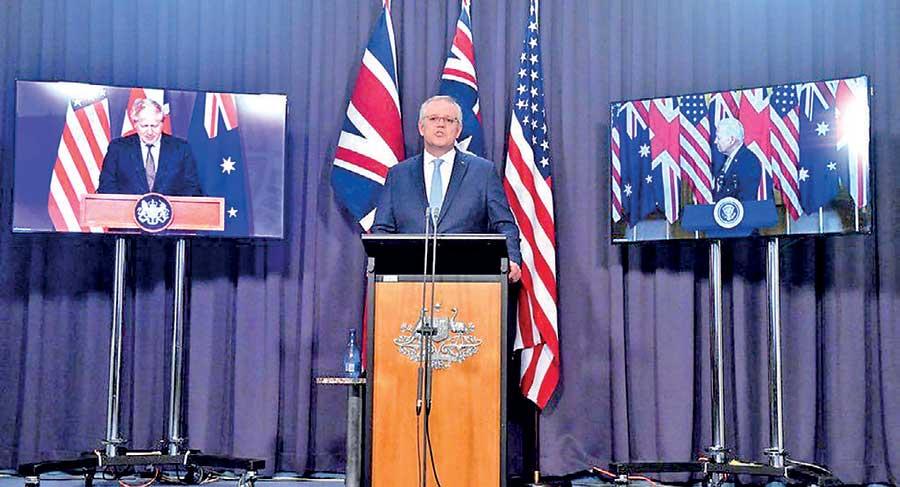Reply To:
Name - Reply Comment

Australian Premier Scott Morrison (centre) is linked online with US President Joe Biden and British Premier Boris Johnson as they announced the AUKUS deal. Pic courtesy EPA
In what appears to be a straw for the proverbial drowning man, the United States has clutched at a new defence alliance, in the hope that with its help, it can remain afloat as the world number one power.
alliance, in the hope that with its help, it can remain afloat as the world number one power.
On September 15, the US, the United Kingdom and Australia formalized a defence alliance now known as AUKUS. Even an elementary level political science student will say that the new alliance is a move to contain China, however much the US says it is not. This is a typical Thucydides’ Trap, which simply means that when a rising power threatens to displace a ruling power, the resulting structural stress makes a violent clash the rule, not the exception.
The AUKUS move was secretive and shocking to even some of Washington’s European allies. It has caused some cracks on the walls of the US-led Atlantic alliance. In an immediate reaction, an angry France, describing the new security partnership as a stab-in-the-back, recalled its ambassadors from Washington and Canberra and pulled out of high-level defence talks with Britain. In the run up to the September 15 AUKUS announcement, the US did not care two hoots about France’s national interest and did not even think it was necessary to apprise its Nato allies of the new alliance. Following the announcement, Australia scrapped a multibillion-dollar submarine contract with the French, in favour of an AUKUS deal aimed at arming the Australian Navy with nuclear-powered submarines to be built in cooperation with the US and Britain. Australia will become only the seventh nation to possess nuclear submarines and this will have significant impact on the balance of power in the region in relation to China.
Washington’s new move was similar to a boatman, while at sea, plugging a hole in his boat only to find the water coming in from another hole. When the US moved to strengthen its defences in the Indo-Pacific region with AUKUS, it found cracks on its defence wall on the European front. The AUKUS move has caused much discontent among Washington’s European allies. Not only France, even Germany was concerned about the US action. Reports say the European Union is contemplating the postponement of month’s trade and technology cooperation summit with the US.
On Wednesday, in a damage-control action, US President Joe Biden had a phone conversation with French President Emmanuel Macron, and indirectly admitted that the US had committed a mistake by not having open consultations with allies before the AUKUS announcement. Yesterday, US Secretary of State Anthony Blinken was scheduled to meet his French counterpart Jean-Yves Le Drianon on the sidelines of the United Nations General Assembly annual sessions in New York. Analysts, however, note that the US apology covered only the mistake of keeping the allies in the dark over AUKUS, but it expressed no regret over the formation of the AUKUS.
For Washington’s European allies, AUKUS should teach them a lesson in alliance formation and warn them about overdependence on the US to defend themselves. Although France and Germany are key Nato members, the two nations were once seriously mulling over forming a Europe-led defence arrangement for Europe. This was when questions loomed over the raison d’etre of Nato against the backdrop of the Cold War’s end in 1991.
The French-German proposal came to an abrupt end with the US strongly opposing the dissolution of Nato and reassuring them of the US commitment to defend its Nato allies. But in view of former US President Donald Trump’s America-first policy that caused fissures within Nato and Britain’s exit from the EU, the European Union has gradually been intensifying moves aimed at reactivating a Euro-centric defence dialogue. A day after the AUKUS announcement, the EU released on September 16 its Indo-Pacific strategy, giving importance to trade, security and democracy promotion.
The new global realities require not only France but also every nation to carry out a fresh assessment of its security. The manner in which the US withdrew from Afghanistan last month, abandoning the government of President Ashraf Ghani, a servile ally, has raised questions as to the United States’ trustworthiness as a protector. Surely the stab-in-the-back on France and the Ghani government underscores a fundamental rule in power politics that a nation should be concerned firstly, secondly and lastly, only with its national interest. In this context, a nation pursuing global power, considers its allies as important only as long as they are useful.
It is premature to assume that France will cease to become a US ally or the Nato alliance will wither away. Despite the diplomatic ruckus over AUKUS, Nato will continue to remain an important cog in Europe’s defence wheel because of two US-made bogeys -- Russia and the so-called Islamic terrorism. However, no threat is permanent. Sooner or later, an enemy could be an ally, and the so-called Islamic terrorism which is believed to be manufactured in intelligence laboratories could be a thing of the past.
Therefore, nations need not overly depend on alliances to protect themselves, because alliances have their shelf lives. Alliances such as the Cold War era South East Asian Treaty Organisation (SEATO) had vanished even before the Cold War ended.
Another example is ANZUS. It brought together the US, Australia and New Zealand in a Nato-like defence partnership. It has remained largely defunct and AUKUS has virtually performed the last rites on it due to New Zealand’s opposition to Australia’s use of nuclear power for military purposes.
The AUKUS move also highlights how perturbed the US has been over China’s rise as a global power, how preoccupied it has been with the China question and how impatient it has been in forming alliances to fortify its position in the Indo-Pacific region vis-à-vis China.
As part of this China-containing strategy, the US had earlier floated the Quadrilateral Security Dialogue or the Quad, teaming up with India, Australia and Japan. The Quad is largely an informal defence arrangement. When the Quad leaders meet today in Washington, President Biden is expected to explain why the US formed AUKUS, an inner circle within the Quad.
AUKUS has virtually turned Australia into a US hitman in the Indo-Pacific region. The Aussie Navy will soon be like an appendage of the US Navy in the region. Australia, whose Prime Minister Scott Morrison describes AUKUS as a forever partnership, is already hosting a US military facility in Darwin. The facility overlooks the waters China considers its backyard and is part of a defence ring encircling China, although China is Australia’s biggest trading partner.
With Canberra’s newly acquired nuclear submarines moving stealthily in waters contested by China, needless to say, the region will see more tension and an unwanted arms race at a time when the global resources are needed for the fight against the Covid pandemic and Climate Change.